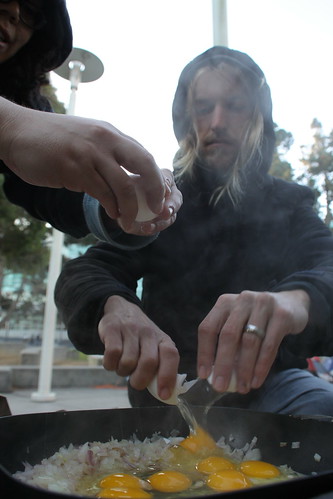
Bags of rice, sacks of beans and cans of tomatoes. While this may sound like the contents of anyone’s pantry, these are only some of the groceries in the well-stocked kitchen tent at Occupy SFSU.
Protesters have been occupying Malcolm X Plaza in front of the Cesar Chavez Student Center for a little more than a week. They share a similar ideology and rhetoric as other Occupy movements both locally and across the country.
Another similarity? Like many other Occupy encampments, life at Occupy SFSU includes at least two free meals a day.
“Sometimes lunch is open-ended,” said Kaitlin Cornell, a sophomore studying theater, who has been staying at the encampment since its inception last week. Cornell has only left the encampment two times since then for brief visits to her home.
According to Cornell, the meal schedule at the camp includes breakfast and dinner that are cooked and eaten together. Cornell said that eating together has had a “huge impact” on building a sense of community at the camp.
“I’ve already felt so close to everyone here,” Cornell said. “I don’t ever want to break up,” she added with a laugh.
Along with tents and general assemblies, pop-up and makeshift kitchens have become part of the landscape of Occupy encampments. At Occupy SFSU, the kitchen facilities are sparse, but they still manage to produce communal meals like pots of soup and bowls of pasta.
According to Cornell, food and groceries have been donated by many different sources, including from vendors from the student center bringing unsold or leftover product to the camp.
One recent night Occupy SFSU camper Wes Vasquez visited the student center’s Taqueria Girasol in an attempt to see if they had any leftover food to donate. When asked by Vasquez, a counter employee at the taqueria seemed unsure of any policy regarding donating food that would otherwise be thrown out.
“I’m not sure if that’s against the law,” the employee said.
After consulting with a manager, the employee returned and told Vasquez that they were not allowed to give away food product.
Returning empty handed, Vasquez acknowledged that the encampment was making an effort to stay within legal parameters when it came to preparing food. Since this includes not having any open flames at the camp, all hot food is prepared using electric hot plates.
“We’re making sure we’re not felt as a threat – a physical threat,” Vasquez said.
Vasquez sees one strength of Occupy SFSU as a living social experiment. By creating a camp that is able to meet member’s needs, Vasquez sees Occupy SFSU as an “experiment in accountability.” And one of those needs will always be food.
“We’re cultivating power,” said Occupy SFSU camper and kitchen crew member Napa Sanchez. “This is a beautiful opportunity to reconnect,” Sanchez added.
While the camp is meeting the food needs of its members, Sanchez emphasized that they are still looking for volunteers with cooking experience to come to the camp each day to help prepare meals. They are also seeking donations of miscellaneous kitchen items from bowls and cutlery to cutting boards.




